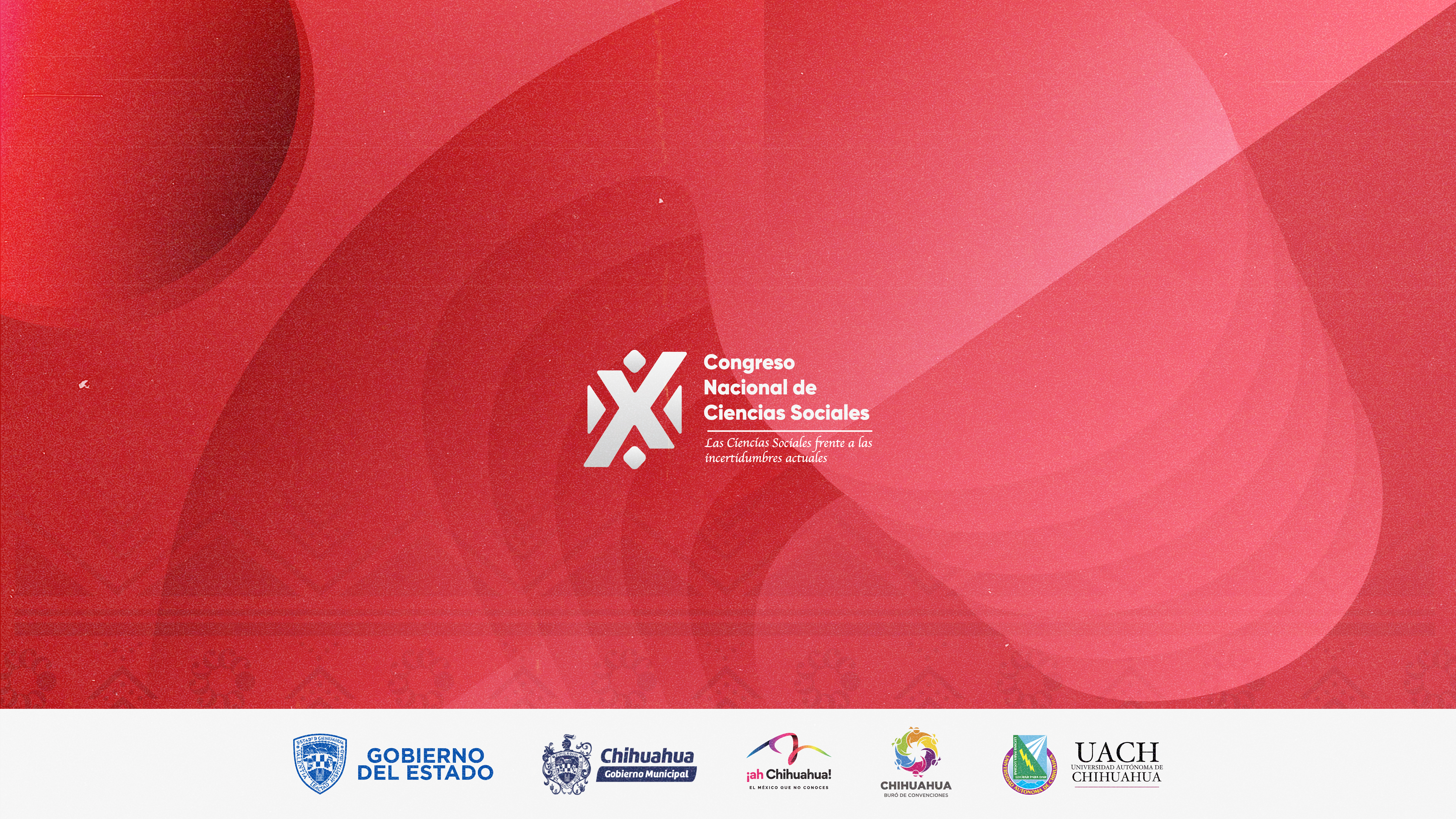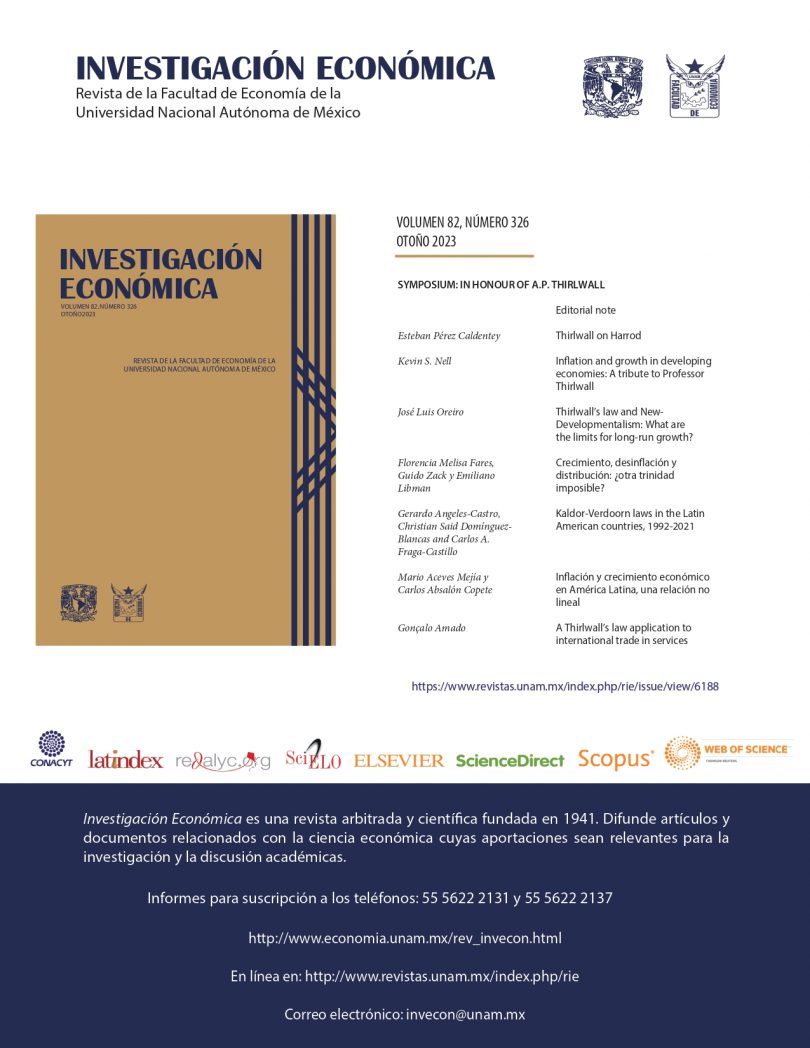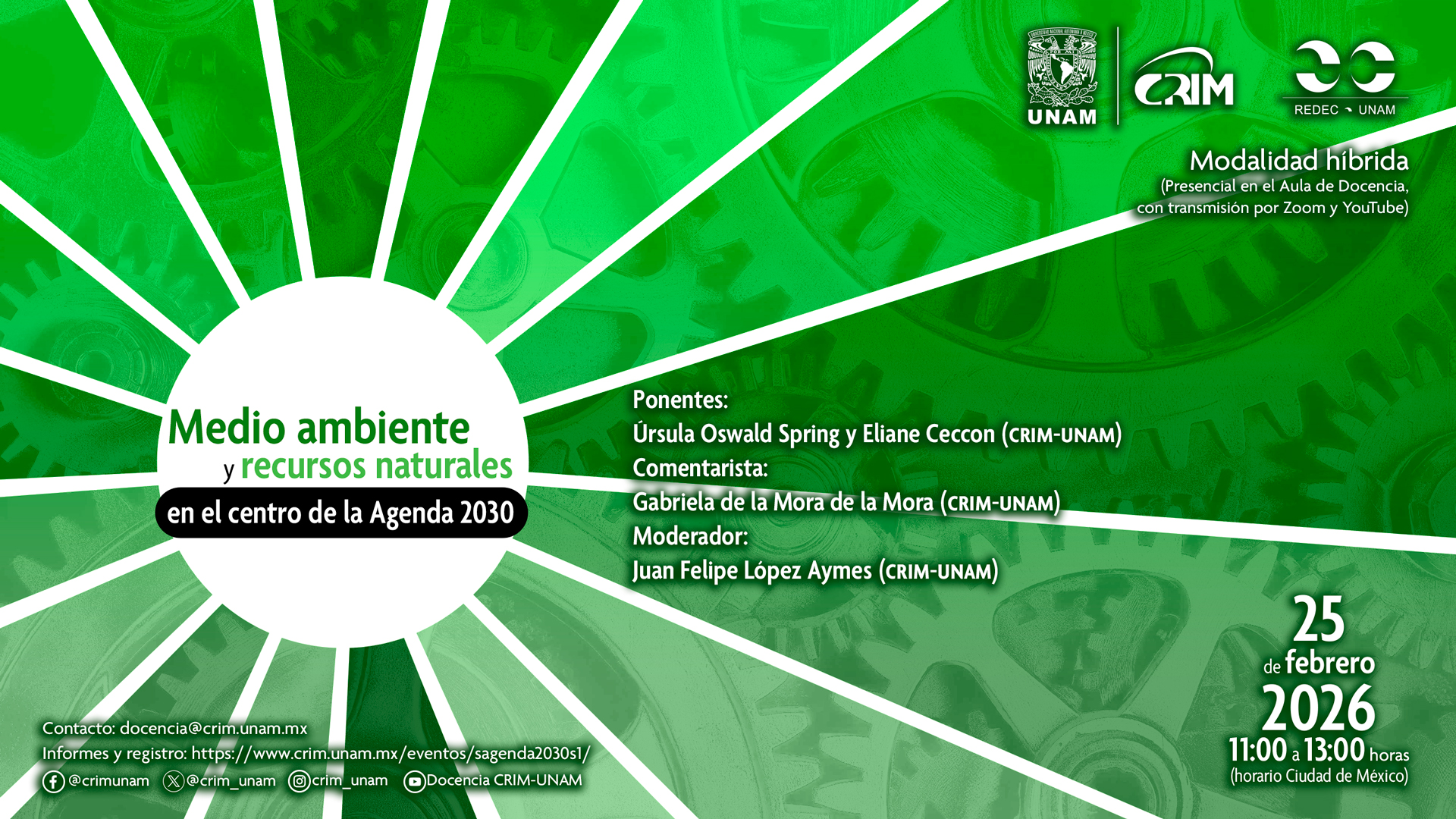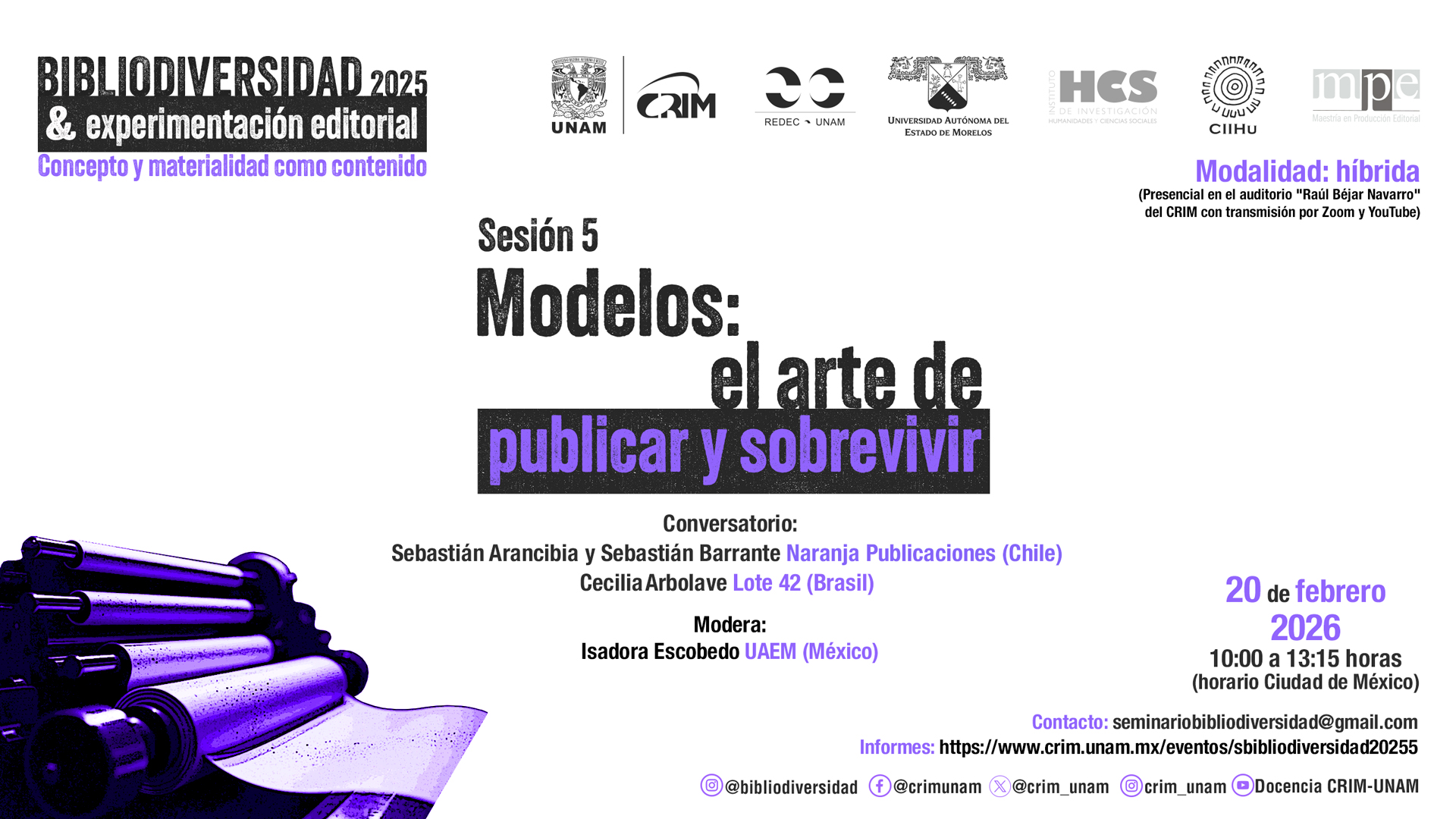Investigación Económica, núm. 326
Investigación Económica
Revista de Facultad de Economía de la Universidad Nacional Autónoma de México
volumen 82, número 326 (2023)
SYMPOSIUM: IN HONOUR OF A.P. THIRLWALL
EDITORIAL NOTE
Tony Thirlwall has been a long-standing contributor to Investigación Económica (IE), a distinguished member of its Editorial Board and a recurrent visiting Professor of the School of Economics of Universidad Nacional Autónoma de México (unam). The present Special Issue of IE is a fitting homage to his numerous contributions to economic science. His balance-of-payments-constrained growth model, sometimes called Thirlwall’s law, published in 1979, gained him worldwide reputation —and rightly so— among economists avidly seeking an alternative rationalisation of the dynamics of a modern capitalist economy.
In his model, Thirlwall presents a dynamic analogue of Harrod’s static foreign trade multiplier; his rendition claims that the long-run growth rate of an open economy, consistent with balance of payments equilibrium (yb), is given by the ratio of the growth rate of exports (x) to the income elasticity of the economy’s demand for imports (π). The brief serenity and parsimonious charm of Thirlwall’s law ( yb = x/π) provided a climax of its author’s work, though it instantly attracted both criticisms and sympathies.
Thirlwall’s dynamic foreign trade multiplier heralded the Renaissance, as it were, of the key role of aggregate demand in the theory and empirical analysis of output growth and employment, an approach which had been anathema ever since the inception of Solow’s supply-side growth theory. It has been a dogma in the academy that supply rules the roost, supply creates its own demand (Say’s law). Thus, under the assumption of price, exchange rate and wage flexibility, the interest rate will warrant a tendency for the economy to achieve a level of full employment savings and investment. This gullible “fact” seems to be at variance with the real world (Francis Bacon believed that sometimes sugar-coating is needed, that ‘truth is so hard to tell, it sometimes needs fiction to make it plausible.’)
Thirlwall’s Keynesian-and-Harrodian mode of thinking challenged and lambasted the received orthodoxy; his theory, unpalatable as it might be, as he puts it, liberated Keynes from ‘the straitjacket of Samuelson’s 45-degree line diagram which does not model the supply-side of the economy’ (Thirlwall, 2018, p. 14). His model runs counter to the conventional wisdom as he argued that supply endogenously adapts to demand. He concludes that the balance of payments equilibrium constraint may not warrant a full employment growth rate of output. In particular, this is the case of developing economies exhibiting permanent structural unemployment and inflation (i.e., stagflation) as a result of their warranted growth rate being lower than their natural or optimum growth rate.
The remarkable papers we have in store in the present Special Issue for our readers mainly delve into Thirlwall’s law, theoretically and/or empirically. True, that is Tony’s most renowned contribution to economics. Yet, it is fair to say that there is much more to Tony’s contributions, his extensive range of writing also: i) pioneered the analysis of the non-linear relationship between inflation and growth [mild inflation can be a stimulus for growth, deflation is the wrong recipe to overcome underdevelopment (Thirlwall, 1974)], anticipating by two decades the mainstream “discovery” of that non-linearity; ii) provided the first endogenous growth theory consistent with Keynes’s principle of effective demand; iii) amended Harrod’s theory substituting Thirlwall’s law for the natural growth rate as the true long-run constraint of economic growth; iv) demonstrated, theoretically and empirically, that both trade and financial liberalisation are bound to generate stagnation, structural unemployment, income inequality and further underdevelopment and, last but not least, v) contrary to Albert Hirschman’s dictum, he made a laudable demonstration that development economics is well and alive, it is not ‘a soft option’, instead it is a field cultivated by the best minds of the history of economic thought such as Adam Smith, David Ricardo, Thomas Malthus, John Stuart Mill, Karl Marx, Nicholas Kaldor, Roy Harrod, Arthur Lewis, Simon Kuznets, Gunnar Myrdal, Raúl Prebisch, Celso Furtado, Juan F. Noyola, Amartya Sen, Elinor Ostrom, Joseph Stiglitz, Tony Atkinson, Angus Deaton, among others.
Thirlwall (2018) argues that development economics has enriched economic analysis with a number of theories and categories of paramount importance, he mentions Rosenstein-Rodan’s “big push”, Lewis’s dual economy model, the immiserising growth model, Myrdal’s theory of cumulative causation, the dual-gap and rural-urban migration models, the theory of structural inflation, and the Latin American dependency theory, among others.
Tony Thirlwall is a philosophically minded economist, not only a quantitatively rigorous theoretician forging models to enhance the welfare of mankind. Economics is a moral science for him, ‘a branch of ethics’, concerned with ‘the lives and welfare of poor people of poor countries’ (Thirlwall, 2018, p. 34); it is fair to say that his theory accounting for the principal economic phenomena of growth and development and his policy inferences therefrom, are founded on Smith’s (1759 [1982]) moral sentiment of sympathy (from the Greek word sympatheia), on the Stoic ethics of social harmony which rejects the idea of injuring others for one’s advantage. Tony’s conception of his intellectual duty can be illustrated with the following passage: “I have never succumbed to the temptation of lucrative consultancy work.” (Thirlwall, 2018, p. 23).
Finally, Tony Thirlwall’s works, spirit and friendship are a source of inspiration in our present stirring and difficult age of uncertainty, fast labour-saving technological change, widespread inequality, ecological destruction, and financial exuberance. His untiring commitment to truth and critical thinking, his unremitting pursue to knowledge and his inflexible integrity —a humanist paradigm worth imitating— should invite us to reflect and seek the pursue of virtue, of meaningful dialogues and a lifestyle of moral and personal integrity in this world tormented by distraction and glamourous noise.
Ignacio Perrotini Hernández
Editor-in-Chief
Nancy I. Muller Durán
Associate Editor
Sara M. Ochoa León
Associate Editor
REFERENCES
Smith, A. (1759 [1982]). The Theory of Moral Sentiments. Indianapolis: Liberty Classics.
Thirlwall, A.P. (1974), Inflation, Saving and Growth in Developing Economies.
London and Basingstoke: Macmillan.
Thirlwall, A.P. (2018). A life in economics. PSL Quarterly Review, 71(284), March, pp. 9-39. https://doi.org/10.13133/2037-3643_71.284_2
Ver número completo>>
Te puede interesar

Convocatoria Feria del libro
Laura Gutiérrez - Feb 04, 2026FERIA DEL LIBRO X CONGRESO NACIONAL DE CIENCIAS SOCIALES “Las Ciencias Sociales frente a las incertidumbres actuales” INVITACIÓN Información general…

Hoteles con convenio | X Congreso Nacional de Ciencias Sociales
Laura Gutiérrez - Ene 28, 2026X Congreso Nacional de Ciencias Sociales Las Ciencias Sociales frente a las incertidumbres actuales del 23 al 27 de marzo…

Memorias del IX Congreso Nacional de Ciencias Sociales
Roberto Holguín Carrillo - Jul 02, 2025IX Congreso Nacional de Ciencias Sociales Las ciencias sociales y los retos para la democracia mexicana. Realizado en el Instituto…

COMECSO felicita al Dr. Gerardo Estrada
comecso - Feb 11, 2026Más sobre su trayectoria en Gaceta UNAM

29 años de El Colegio de San Luis
Laura Gutiérrez - Feb 11, 2026El Colegio de San Luis celebra 29 años de historia y compromiso El Colegio de San Luis A.C. (Colsan) es…











